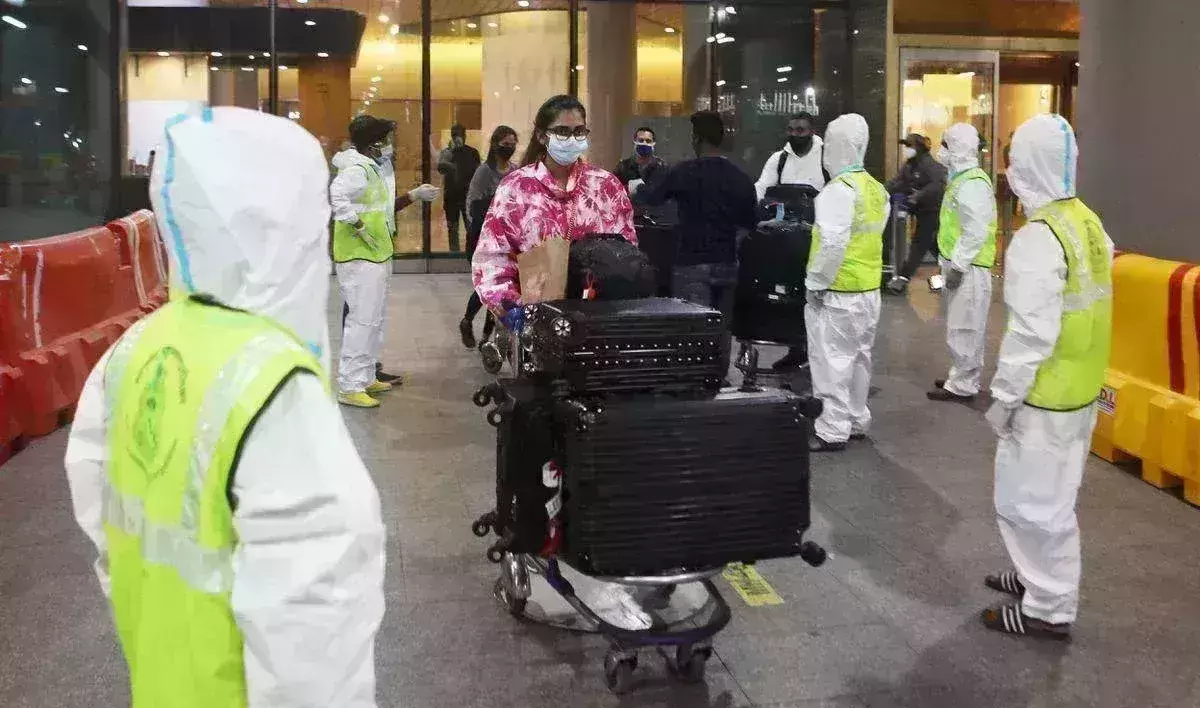
COVID-19 travel ban: Kerala expatriates unable to return to jobs, families in Gulf countries
text_fieldsThe United Arab Emirates on July 16 extended the travel ban on passenger flights from India, which has been in place since April 24, till July 31. UAE is one of many Gulf countries to implement a ban on passenger travel in India due to rising Covid-19 cases. Others include Saudi Arabia, Oman, Kuwait, and Bahrain. As a result, expatriates have been living in a state of continuous stress and uncertainty for months on end.
Phasal K P is one of many such expats. He arrived in his hometown in Kozhikode on January 28 for a long-due vacation. What followed was the second wave, a state-wide lockdown and finally, a travel ban that restricted him from returning to Dubai, UAE where he has been doing business for almost three decades.
Phasal has been living off his savings and waiting for more clarity on the situation for the past 3 months while his business partner holds the fort down back in Dubai. The ban was initially implemented for a period of 10 days, but with the alarming rise in infections in the country and the aggravated spread of variants such as the Delta variant, it was repeatedly extended. Amid all this uncertainty, his visa expired. While he is fully vaccinated, he received Bharat Biotech's Covaxin, which currently does not fall under the UAE's list of approved vaccines.
Addressing these issues, Phasal said: "I have two major concerns— the first is about my visa. I have faith that the UAE government will announce some provisions for people whose visas expired under these circumstances, but we are yet to receive any information. The second and larger concern is regarding the vaccine. I got the Covaxin vaccine before I came to know that it is not approved by the UAE for travel. I hope the vaccine will receive the proper approval from both WHO and the UAE government soon. Once these issues are sorted, I need to return to my job so that I can continue to provide for my family."
Mohammed Ameenas, a Kozhikode native currently unable to return to his job as purchasing manager in Ras Al Khaimah, faces similar concerns. He travelled to his hometown in February with the intention to return to the UAE in April, but the travel ban hindered his plans. "Because I was unable to return, my employer hired a temporary staff member to take my place. Since I have been here for almost 5 months, my concern is that they will make the temporary staff member permanent and I will be out of a job," said Ameenas. He considered bypassing the travel ban by travelling through other countries such as Serbia but decided against it because of the high-cost tickets and institutional quarantine would incur.
The United Arab Emirates is not the only country to implement such travel restrictions. In Saudi Arabia, the travel ban has been in place since February 3. Misfer Abdulla, a Kozhikode native working as an operations supervisor for an Industrial Manufacturing company in Dammam, Saudi Arabia, has been in Kozhikode since November 2020. "I intended to return to Dammam by first travelling to either the Maldives or the UAE, which is what my colleagues were doing, but I no longer have that option," said Misfer. While his visa has expired, he is not too worried as the
Saudi Arabia government has provided a lot of provisions and exemptions for expatriates since the beginning of the pandemic last year.
The travel ban affects not only the working class but students as well. Olivia Antoinette D'cruz, a Kannur native and Masters student at Kristu Jayanti College, Bengaluru, has been unable to return to her family in Muscat, Oman due to the travel ban. She arrived in Bengaluru in February to attend classes and has been in the country since. "It would be really helpful if they would at least allow students to go back home to their families. I have been struggling living here by myself during the lockdown and the second wave. The PG (paying guest) facility I am living in is mostly empty, and for almost a month I had to order food every day because the people working in the PG all tested Covid-positive," she said.
Travel restrictions not only stop people from leaving the country but discourages them from entering the country as well. Merlyn Sara Andrews, a Kottayam native raised in Oman, noted that her mother is apprehensive of travelling to India at this time because of the uncertainty surrounding her return to Oman. "My entire family, including my father, brothers and me, are together in Kottayam, while my mother is still in Muscat. It's been almost 2 years since she visited her hometown. She really wants to come, but since she doesn't know when she can go back she is staying put," said Merlyn.
Travel bans have separated people from their homes and jobs and have induced a constant state of anxiety, frustration, and confusion among expatriates.






















